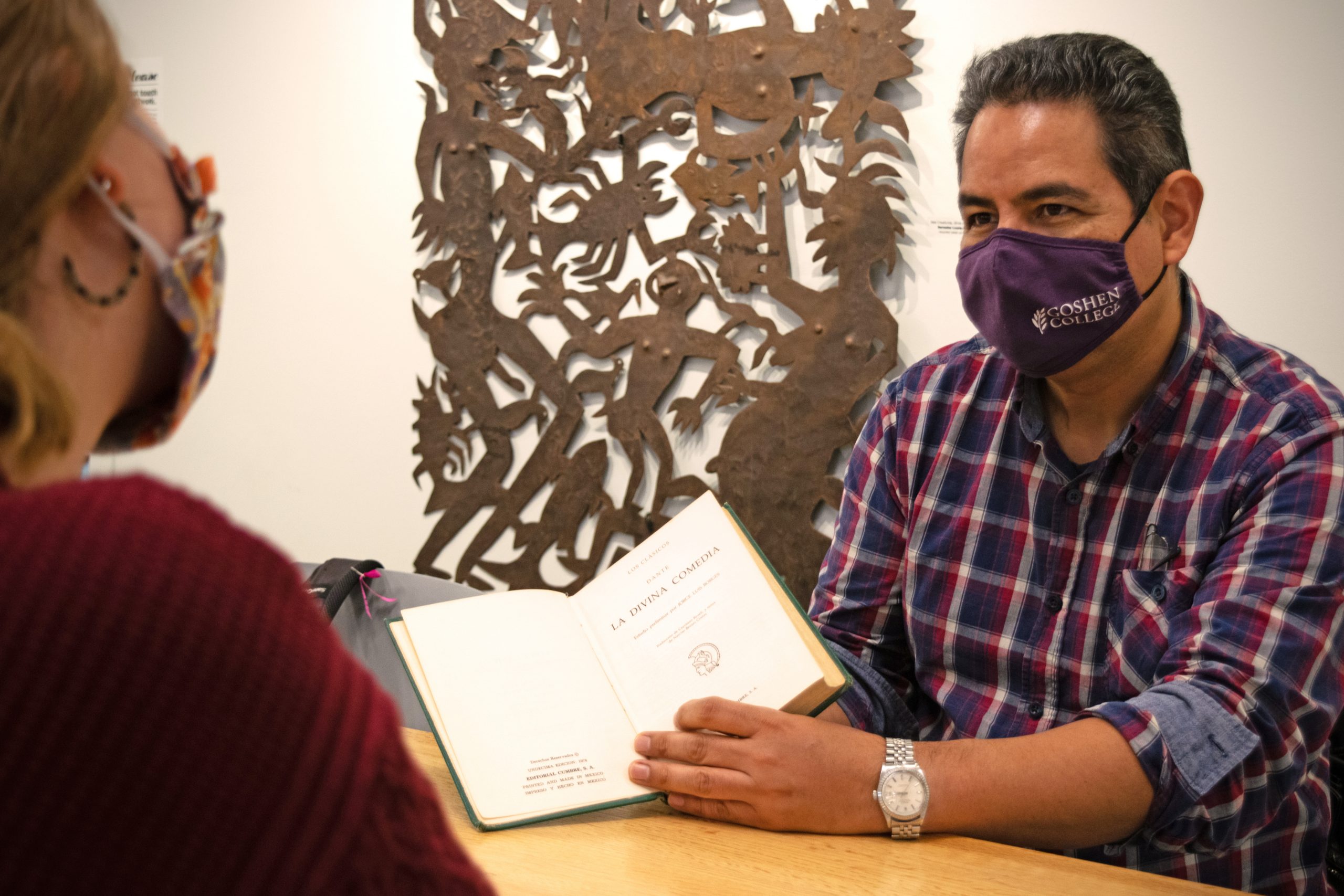Cristobal Garza Gonzalez sits at a table in the Hunsberger Commons, holding an old Spanish translation of Dante’s The Divine Comedy. He is reading quietly, until he notices somebody he recognizes walk by.
“Hola! ¿Cómo estás?” he says with a wave, inviting them into conversation. If they choose to take the bait and sit down, Charlas will officially commence.Charlas, which can be directly translated to “chats,” is a weekly gathering hosted by Garza Gonzalez, assistant professor of Spanish. It has one primary goal: to give people a place to socialize in Spanish.
“The idea for this came from my experiences at Indiana University and Earlham College,” Garza Gonzalez said.
He started Charlas at Goshen College during his first semester here, in the fall of 2019.
Originally, Charlas would alternate weekly between Java Junction and the Leaf Raker, and it was held in the evening when students were not as busy. The idea was that each setting would be populated with students already, and the group could grow organically.
“We had kind of a captive audience,” Garza Gonzalez said, describing how he and the other participants would rope people they knew who spoke some Spanish into the conversation. “We tried to embarrass people into coming.”
However, after a year off due to COVID-19, Charlas looks a little different this year. It is still held on Wednesdays — from 3 to 4 p.m. — but in the warmer months, the group met outside. Now, as the weather gets colder, they are meeting in the Hunsberger Commons.
There is no prerequisite for attending Charlas; any level of Spanish is welcome, from very minimal to fluent. Garza Gonzalez hopes that, for beginners, Charlas can make their classroom learning applicable to the real world and help them gain confidence speaking.
“Charlas is a good way to practice gaining fluency,” said Anna McVay, a senior sustainability studies major who attended Charlas on Wednesday. “I did not understand a lot of our conversations today,” she said, but “it was good because I felt like I could just listen … I wasn’t obligated to speak.”
Without an end goal in mind, conversation flows freely between a variety of topics: mangoes, music, idioms, the various Spanish words for armpit, and technology. Garza Gonzalez just bought his first smartphone this year from a friend for $100, a steep price for an iPhone 5.
For Cathy Stoner, campus pastor, Charlas provides a unique opportunity to connect with others.
“Speaking to somebody in their own language,” she said, “you can experience a side of that person, a side of themselves that you can’t otherwise.”
Garza Gonzalez echoed this sentiment, but added that in addition to helping you understand those you are in conversation with, “it opens up the other half of you and who you are.”
Stoner also believes that Spanish in particular is an extremely valuable language to learn. She said that she practices her Spanish not just because it’s fun but also “to communicate with half of the United States.”
Terry Martin, assistant professor of Spanish, agreed that speaking Spanish is an invaluable skill for students to have.
“A lot of students see the value of being bilingual as something that can help them in a future career,” he said. Stoner added that at the very least you can “add dollars to your hourly!” Although Charlas doesn’t attract large numbers each week, Garza Gonzalez doesn’t mind.
“This turnout, to me – it is pretty good,” he said. “And if nobody shows up, I can just read my book!” For students interested in improving their Spanish but hesitant to show up for Charlas, Stoner has one piece of advice: “No las pienses, hazlo!” (Don’t just think about it, do it!)




